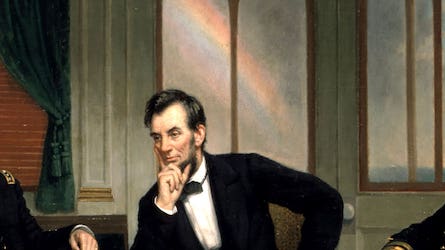
Abraham Lincoln (1809-1865). An American lawyer, politician, and statesman, served as the 16th president of the United States from 1861 until his assassination in 1865. He led the country through the American Civil War, preserved the Union, defeated the Confederacy, played a crucial role in abolishing slavery, expanded the federal government’s power, and modernized the U.S. economy.
Lincoln was born into poverty in a log cabin in Kentucky and was raised on the frontier, mainly in Indiana. Self-educated, he became a lawyer, Whig Party leader, Illinois state legislator, and U.S. representative from Illinois. In 1849, he returned to his successful law practice in Springfield, Illinois. However, angered by the Kansas–Nebraska Act in 1854, which opened territories to slavery, he re-entered politics and soon became a leader of the new Republican Party.
He gained national prominence during the 1858 Senate campaign debates against Stephen A. Douglas. In 1860, Lincoln ran for president and won, sweeping the North. His election was seen as a threat to slavery by pro-slavery elements in the South, leading to Southern states seceding and forming the Confederate States of America. Confederate forces attacked Fort Sumter shortly after Lincoln’s inauguration, prompting him to mobilize forces to suppress the rebellion and restore the Union.
As a moderate Republican, Lincoln navigated a contentious political landscape, balancing demands from War Democrats and Radical Republicans. His Gettysburg Address became one of the most influential statements of American national purpose. He closely supervised the war effort, including the selection of generals and implementing a naval blockade of the South.
In 1863, Lincoln issued the Emancipation Proclamation, declaring slaves in rebellious states to be free and directing the Army and Navy to recognize and maintain their freedom. He successfully managed his re-election campaign in 1864, seeking to heal the nation through reconciliation.
On April 14, 1865, just days after the Confederate surrender at Appomattox, Lincoln was assassinated by Confederate sympathizer John Wilkes Booth while attending a play at Ford’s Theatre in Washington, D.C. He is remembered as a martyr and a national hero for his leadership during the Civil War and efforts to preserve the Union and abolish slavery. Lincoln is often ranked as the greatest president in American history.
Lincoln had a private life that included deep, personal relationships. In his teens, he was tall, strong, and athletic, and an active wrestler, becoming county wrestling champion at 21. In 1837, he moved to Springfield, Illinois, where he met Joshua Fry Speed, who became his bed partner for four years until Speed felt socially obligated to marry.
By 1840, both Lincoln and Speed were considered past the marrying age. Both were hesitant to marry, but it was a de facto requirement for a political career. Speed eventually married and moved to Kentucky, leaving Lincoln, who then suffered a mental breakdown. He recovered only after visiting Speed and his new wife in Kentucky.
Shortly thereafter, at 32, Lincoln met Mary Todd in Springfield, and they became engaged the following year. Their wedding, initially set for January 1, 1841, was canceled due to Lincoln‘s cold feet. They reconciled and married on November 4, 1842. Despite anxiously preparing for the nuptials, Lincoln was asked where he was going and replied, “To hell, I suppose.”
Lincoln became an affectionate husband and father of four sons, though his work often–perhaps conveniently–kept him away from home. Three of their boys tragically died young, profoundly affecting both parents. Lincoln suffered from “melancholy,” now thought to be clinical depression, and Mary struggled with severe stress and loss, leading to her being committed to an asylum by their only surviving son in 1875.
Lincoln’s relationships with men, including his close friendship with Joshua Fry Speed and his bodyguard Capt. David Derickson, have led some historians to explore his possible bisexuality. Carl Sandburg first noted Lincoln’s private side in his 1926 biography, describing his early relationship with Speed with “a streak of lavender, and spots soft as May violets.” This aspect of Lincoln’s life was further explored in C.A. Tripp‘s 2005 book, The Intimate World of Abraham Lincoln.
Lincoln’s same-sex relationships, while speculative, provide a complex picture of a man who, despite personal struggles, loved his wife and craved a family. Mary Todd Lincoln‘s mental collapse may have been influenced by the immense tragedies they endured and possibly by discovering her husband’s relationships with men.